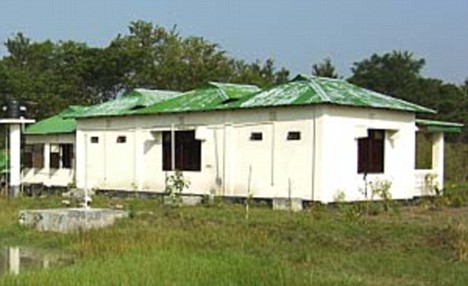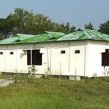
UK Charity Funding Arms and Training for Bangladeshi Terrorists
Publication: Terrorism Monitor Volume: 7 Issue: 9
By:

Bangladeshi police reported in March that they had discovered an apparent bomb-factory in a madrassa in the district of Bhola, a relatively remote part of southern Bangladesh. Police reported the discovery of 10 firearms and 2,500 rounds of ammunition in the madrassa, along with books by writers such as Abu Ala Maududi, the founder of Pakistan’s Jamaat-e-Islami, an Islamist political party (Daily Star [Dhaka], March 26; Bangladesh News 24 Hours, March 26). It quickly became clear that the madrassa was funded and run by Green Crescent, a UK-registered charity based in Manchester, England. Bangladeshi police described the madrassa as a "mini-ordnance factory," adding it was used to train militants (BBC, March 25). Bangladeshi media speculated that the madrassa is linked to Jama’atul Mujahideen Bangladesh (JMB), an Islamist militant group that has carried out several prominent attacks in Bangladesh in recent years (Daily Star, March 26).
Upon raiding the madrassa, police immediately arrested four employees they found at the scene. They also began a nation-wide search for Dr. Faisal Mostafa, the head of the charity, with Bangladeshi police reporting his arrest on April 6 (Daily Star, April 7; bdnews24.com, April 7). There were widespread reports that the police held him for as long as ten days before announcing his arrest. Mostafa’s family has claimed that their son is innocent of all the accusations, denying reports of the bomb factory and saying that their son was only a “hunter” who made his own ammunition (Guardian, March 27). Although the charity was based in the UK, British police have not yet made any arrests relating to the developments in Bangladesh.
The investigation into the Green Crescent charity comes at a time of heightened tensions in Bangladesh. Only a few weeks earlier, a February revolt by members of the country’s Bangladesh Rifles (BDR) border guards occurred in Dhaka, the Bangladeshi capital. Nearly 70 army officers were brutally massacred in the mutiny. Although the government has said that the revolt was caused by low pay and poor conditions, there has also been speculation that Islamist militants were involved. The best known of the murdered officers was Colonel Gulzar Uddin Ahmed, whose mutilated remains had to be identified by DNA testing. Only recently appointed to the command of the BDR, Colonel Gulzar had specialized in counterterrorism operations as chief of intelligence and later commander of the Rapid Action Battalion (RAB). He led numerous anti-terrorist operations against the JMB, Harkat ul-Jihad-e-Islami (HuJI) and other militant groups. Dhaka’s Daily Star said that his brutal murder suggested his killers were militants “fed by a deep-seated grudge” (Daily Star, March 12). As investigators probe the background of each mutineer for past affiliations with radical groups, Commerce Minister Faruk Khan, who is heading the investigation, pointed to infiltration of the BDR by militant groups such as the JMB (Daily Star, April 5).
The news that the madrassa was apparently run and funded from the UK has wider implications beyond Bangladesh – over 500,000 Muslims of Bangladeshi origin have British citizenship in the UK and as a result enjoy visa-free travel to the United States, Europe and elsewhere. Although most British Muslims involved in Islamist militancy have been of Pakistani origin, the discovery of apparent British links to Bangladeshi militancy is a potentially disturbing development. Increasing militancy among British Bangladeshis would further complicate the task of British and international security services who are already struggling to contain Islamist terrorism originating in the UK.
Faisal Mostafa and the Green Crescent
Faisal Mostafa is the head of the Green Crescent’s charity operations in Bangladesh and is registered by the UK charity commission as the charity’s chief trustee. Mostafa, who has a Ph.D. in chemistry, has been charged three times for weapons offenses and possession of explosives and bomb components. In 1996 he was arrested and tried for conspiring to cause explosions after bomb-making equipment was discovered in his house. He was acquitted of this charge after claiming he was writing a book on explosives, but was found guilty of possessing a pistol with intent to endanger life. In 2000, he was arrested again and charged with planning to cause explosions after police discovered a large cache of explosives in Birmingham. In 2002, he was acquitted – although his co-defendant was convicted and sentenced to 20 years imprisonment on the same charge (Telegraph, March 26). In 2008, Mostafa was given a suspended prison sentence after trying to take a gas-powered gun onto an airliner from the UK to Bangladesh. The court accepted his defense that the gun was solely for hunting purposes.
Mostafa’s case is interesting in several respects. Although he is of Bangladeshi ethnic origin, Mostafa lives in Manchester in the British Midlands, whereas most Bangladeshis in the UK live in London. Although his co-defendant from the 2002 trial was also of Bangladeshi origin, there is little evidence so far that Mostafa has been involved with Bangladeshi-based militant groups. There is also little evidence that he had connections to any UK-based extremist groups such as al-Muhajiroun or the Finsbury Park mosque. An interesting inclusion on the list of trustees of the Green Crescent charity is Andreas “Hamza” Tzortzis, a convert to Islam who is a regular speaker at Islamist events, particularly those on British university campuses. [1] Tzortzis is closely linked to the Hizb ut-Tahrir group, accused of inspiring a number of terrorist attacks in the UK and abroad. It is additionally striking that although Mostafa has been connected to several terrorism plots, the UK Charity Commission (whose remit specifically includes tackling terrorist use of charities’ tax-free status) did not interfere with his running of a charity that sent money to Bangladesh.
Rising concerns
At this stage, Mostafa seems not to have been part of any formal UK-based Islamist groups while still having a number of complex and long-standing connections to British individuals involved in Islamist extremism. He also seems to have had only limited connections to the wider British Bangladeshi community – if only because he was based in Manchester rather than London. This gives reason to think that his apparent involvement in running a militant training camp in Bangladesh does not necessarily indicate that British Muslims of Bengali origin are more likely to become involved in militancy.
Historically, British Bengalis, despite suffering disproportionate levels of unemployment, under-education and ghettoization, have very rarely become involved in Islamist militancy – compared, for instance, to British Muslims of Pakistani origin, which make up the overwhelming majority of those convicted of terrorism in the UK. This is partly because Bangladesh does not have a culture of tribal warfare or sectarian conflict on a par with Pakistan or parts of the Arab world or East Africa. In addition, the relatively stable nature of Bangladesh (and its relatively settled borders) means that British Bengalis travelling to their “home” country do not have the same opportunities to receive military training compared to British Pakistanis returning to their places of origin.
The case of the Green Crescent charity comes as the British government grows increasingly concerned about possible links between British Islamists and militant groups in Bangladesh. In April 2008, British Home Secretary Jacqui Smith travelled to Dhaka where she announced that the UK and Bangladesh would form a “joint working group” to implement closer anti-terrorism operations between the two countries (Daily Star, April 10, 2008). More recently, the Prime Minister of Bangladesh, Sheikh Hasina, is reported to have asked the UK to provide additional counter-terrorism support in Bangladesh (VOA, January 17). These high-level contacts come in the context of wider concerns. For example, in July 2007, the Guardian cited British officials as saying that the number of British-Bangladeshi would-be terrorists was increasing (Guardian, July 9, 2007). A grenade attack by HuJI members on the British High Commissioner to Bangladesh in 2004 also doubtlessly helped focus civil servant minds on the problem of Bangladeshi militancy.
In addition, there are a wide variety of historic links between Islamist extremists in the UK and those in Bangladesh. In East London, where most British Bengalis live, almost all of the most prominent Islamic buildings, institutes and organizations are closely linked to the Bangladeshi wing of Jamaat-e-Islami. For example, the East London Mosque is dominated by members of Islamic Forum Europe, JI’s British wing. A senior member of the organization, Chowdhury Mueen Uddin, a trustee of the East London Mosque, has even been accused of carrying out extra-judicial killings during Bangladesh’s 1971 War of Independence as a member of JI’s student wing, which had sided with the Pakistani army against the Bengali nationalists. [2] Furthermore, there are extensive links between Hizb-ut-Tahrir’s UK and Bangladeshi branches. For example, the Bangladeshi branch of Hizb ut-Tahrir was set up by Dr Nasim Ghani, the leader of Hizb ut-Tahrir in the UK. [3]
Conclusion
Although the investigation into Faisal Mostafa and the Green Crescent charity remains in its early stages, it is clear that this is already a significant case. It has un-covered potential serious problems with the UK charity commission’s oversight process – raising the possibility that terrorist groups might still be enjoying tax-free status in the UK. It is also an important reminder that it is not only terrorist groups based in the Middle East and the Afghanistan-Pakistan region that are potentially seeking to work with Islamists in the West – Bangladeshi groups might also be hoping to do the same. The Green Crescent case is also a reminder that Bangladesh suffers from many of the same problems as Pakistan. Although the challenges facing Bangladesh are less acute, the same sort of problems may exist there. For example, it is likely that Bangladesh terrorist groups would be willing to provide military training for Muslims living in the West – just as Pakistani groups have done. Likewise, it is possible Bangladeshi militant groups could be seeking to use funds from emigrants in the west to fund their operations in South Asia.
Notes
1. https://www.charity-commission.gov.uk/ShowCharity/RegisterOfCharities/ContactAndTrustees.aspx?RegisteredCharityNumber=1099233&SubsidiaryNumber=0
2. https://www.genocidebangladesh.org/?p=296
3. Author’s interview with Ed Husain, former member of Hizb ut-Tahrir, April 2009.





